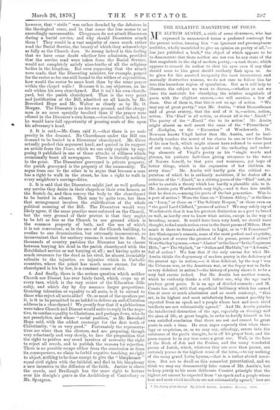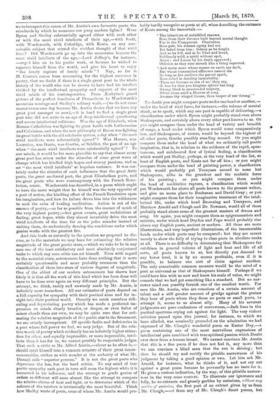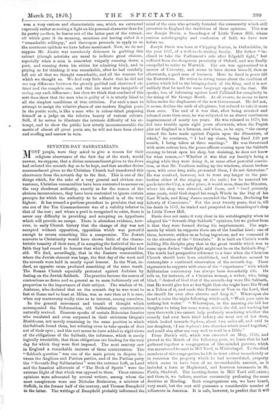THE RELATIVE MAGNITUDE OF POETS.
%TR ALFRED AUSTIN, a critic of some cleverness, who has in expressed in unmeasured terms a profound contempt for the present writer, terming him "an ignorant and presumptuous scribbler, wholly unentitled to give an opinion on poetry at all,"— has just published a book,* the object of which appears to be to demonstrate that there neither are nor can be any stars of the first magnitude in the sky of modern poetry,—a rash thesis, which appears to commit its author to shut his eyes even if any that should seem to him great should. suddenly flash upon us. As he gives for this asserted incapacity the most inconsistent and mutually destructive reasons, we do not care to follow him far into this hazardous region of speculation. But as it will help to illustrate the subject we want to discuss,—whether or not we have the materials for classifying the relative magnitude of poets with the slightest success,—we will mention a few of them. One of them is, that this is not an age of action. " We may say of great poetry," says Mr. Austin, "what Demosthenes said of great oratory, that the soul of it is,—action, action, action. The 'Iliad' is all action, so almost all is the " The poetry of the " fEueid " due to its action ! Mr. Austin might almost as well assert the same of the " Prometheus " of iEschylus, or the " Excursion " of Wordsworth. Dr. Newman knows Virgil better then Mr. Austin, and he inci- dentally touches the secret of his charm in one or two fine lines of his new book, which might almost have referred to some poet of our own day, when he speaks of the endearing and endur- ing elements of Virgil's poetry as his "single words and phrases, his pathetic half-lines giving utterance to the voice of Nature herself, to that pain and weariness, yet hope of better things, which is the expression of her children in every time." Mr. Austin will hardly gain the critical re- putation of which he is evidently ambitious, if he dashes off a criticism of the "Ancid," as a stirring poem of the "Iliad" sort, in order to sustain a theory whieh has hardly a plausible side to it. Mr. Austin puts Wordsworth very high,—and it does him credit that he does so,—among the poets of the last generation. Was he a poet of action? Were the lines on " Tintern Abbey," or the lines on "Lucy," or those on "The Solitary Reaper," or those even on "the good Lord Clifford," poems of action ? We may safely say of Wordsworth that it was his greatest distinction as a poet to brood so well, as hardly ever to know what action, except in the way of brooding, meant. It would have been very hard, we should have thought, to find much action even in the finest poems of Milton. How much is there in Satan's address to Light, or in "Ii Penseroso?" Are Shakespeare's sonnets, some of the most perfect and exquisite, though not of course the greatest of his poems, poems of action ? Were Shelley's poems,—was " Alastor " or the Ii nes "In the Euganean Hills," or "The Skylark," or "Julian and Aladdalo," or "Adonais," full of action ? We fear that if the only excuse for what Mr. Austin thinks the degeneracy of modern poetry is the deficiency of the present age in action,—is it thus deficient, by the way ? was the Crimean war, or the American war, or the Sepoy war in India so very deficient in action ?—the history of poetry shows it to be a very bad excuse indeed. But Mr. Austin has another reason, which he evidently thinks a still better one, why the age can't produce great poets. It is an ago of divided counsels ; and M. Comte has said, with that superficial brilliancy which has earned him at once so much admiration and so much contempt, "that art, in its highest and most satisfactory form, cannot possibly be expected from an epoch and a people whose best and most vivid intellects are not substantially agreed." And Mr. Austin parades the intellectual distraction of the age, especially on theology and the aims of life, at great length, in order to fortify himself in his own satisfied conclusion that there are not and cannot be great poets in such a time. He even urges expressly that when theo- logy or scepticism, or, as we may say, atheology, enters into the substance of the poet's thought, he is off his proper beat, and his poem cannot be in any true sense a great one. Well, in the face of the Book of Job and the Psalms, and the many wonderful poems of Isaiah, which, whatever they are more than poems, are certainly poems in the highest sense of the term,—to say nothing of the many grand Latin hymns,—that is a rather absurd asser- tion. But not to dwell on this somewhat parenthetical, and we think we may say demonstrably false canon of Mr. Austin's, but to keep purely to his more deliberate Comtist principle that the highest art cannot be expected from "an epoch and a people whose best and most vivid intellects are not substantially agreed," how are
* The Poetry of the Period. By Alfred Austin. London: Bentley. 1S71?..
we to interpret this canon of Mr. Austin's own favourite poets, the standards by which he measures our puny modern lights ? Were Byron and Shelley substantially agreed either with each other or with the most vivid intellects of their age,—with Scott, with Wordsworth, with Coleridge, with Keats, on any con- ceivable subject that stirred the vividest thought of that vivid time ? Did 'Wordsworth go up into the mountains because the most vivid intellects of the age,—Lord Jeffrey's, for instance, —urged him on to his poetic work, or because he wished to separate himself from the world, and give his heart to enjoy "the lonely rapture of lonely minds " ? Nay, so far is M. Comte's canon from accounting for the highest successes in poetry, that we doubt if there is a single great poet in the whole history of the world who can be shown to have had his intellect vivified by the intellectual sympathy and support of the most vivid minds of his contemporaries. From .,Eschylus's grand picture of the perfect loneliness of Prometheus to Wordsworth's mountain musings and Shelley's solitary wails,—(we do not come nearer to our own day because Mr. Austin denies that we have any great poet amongst us now),—it is hard to find a single great poet who did not write in an age of deep intellectual questioning and severe intellectual collisions. Was the age of Elizabeth, when Roman Catholicism was fighting its great battle with Lutheranism
and Calvinism, and when the new philosophy of Bacon was fighting its great battle with the old scholastic system, a day when "the most vivid intellects were substantially agreed"? Was Horace, was Lucretius, was Dante, was Goethe, or Schiller, the poet of an age when " the most vivid intellects were substantially agreed" ? To our minds, it would be far more plausible to say that almost every great poet has arisen under the stimulus of some great wave of change which has kindled high hopes and stormy passions, and so set "the most vivid intellects" at hopeless variance. It was cer- tainly under the stimulus of such influences that the great Attic poets, the great medhuval poet, the great Elizabethan poets, and the great poets who were contemporary with the French Revo- lution, wrote. Wordsworth has described, in a poem which ought to have the more weight that he himself was the very opposite of a poet of action, the kindling effect of the French Revolution upon his imagination, and how its failure drove him into the wilderness to seek the calm of healing meditation. Action is not of the essence of poetry,—as far as possible from the essence of much of the very highest poetry,—but great events, great undulations of feeling, great hopes, while they almost invariably drive the most vivid intellects of the time far as the poles asunder instead of uniting them, do undoubtedly develop the conditions under which genius works with the greatest fire.
And this leads us naturally to the question we proposed to dis- cuss, as to the materials we may have for estimating the relative magnitude of the great poetic stars,—which we take to be in any case one of the least satisfactory and most absolutely conjectural tasks to which any sane critic can set himself. Even with regard to the material stars, astronomers have done nothing that is more certainly questionable and more probably erroneous than the classification of them into stars of various degrees of magnitude. One of the ablest of our modern astronomers has shown how likely it is that all the work of this kind which has been done will have to be done over again on very different principles. But the attempt, we think, rashly and unwisely made by Mr. Austin, is infinitely more hazardous. All our estimates of poets depend on a full capacity for sympathy with their poetical aims and for in- sight into their poetical world. Directly we catch ourselves ridi- culing and depreciating poetry which has made a profound im- pression on minds clearly broader, or deeper, or even fuller of minor chords than our own, we may be quite sure that for esti- mating the relative magnitude of that poetic star in the firmament, we are utterly incompetent. Of specific faults and deficiencies in a poet whose full power we feel, we may judge. But of the rela- tive worth of poetry which evidently has an infinitely higher attrac- tion for other, and equally impressible, or more impressible, intel- lects than it has for us, we cannot possibly be respectable judges. That such a critic as Mr. Alfred Austin,—clever as he often is,— ehOuld erect himself into a common measure of these great bloom- mensurables, strikes us with wonder at the audacity of what Mr. Disraeli calls "superior persons." It is not the great poets who depreciate the less, but the hard critics. To any mind of true poetic sympathy each poet in turn will seem the highest while it is immersed in his influence, and the attempt to grade genius of orders so different will seem almost like the attempt to compare the relative claims of heat and light, or to determine which of the colours of the rainbow is intrinsically the most beautiful. Think how Shelley wrote of poets, some of whom Mr. Austin would pro-
bably hardly recognize as poets at all, when describing the entrance of Keats among the immortals :—
" The inheritors of unfulfilled renown
Rose from their thrones built beyond mortal thought Far in the Unapparent. Chatterton Rose pale, his solemn agony had not Yet faded from him ; Sidney as he fought And as he fell, and as be lived and loved, Sublimely mild, a spirit without spot, Arose ; and Lucan by his death approved; Oblivion as they rose shrank like a thing reproved.
"And many more whose names on earth are dark, But whose transmitted effluence cannot die So long as fire outlives the paront spark, Rose robed in dazzling immortality.
'Thou art become as one of us,' they cry.
'It was for thee yon kingless sphere has long Swung blind in unascended majesty, Silent alone amid a Heaven of song.
Assume thy winged throne, thou vesper of our throng.'"
No doubt you might compare poets under one head or another,— under the head of vital force, for instance,—the volume of mental shock, so to speak, which any one poet is capable of delivering,—a classification under which Byron might probably stand even above Shakespeare, and certainly above every other poet known to us. Or you might compare them under the head of variety and breadth of range, a head under which Byron would come comparatively low, and Shakespeare, of course, would be beyond the highest of all other poets, Goethe possibly standing second. Or you might compare them under the head of what we ordinarily call poetic inspiration, that is, in relation to the evidence of the rapid, spon- taneous, and unlaboured flow of lyrical feeling, a classification which would put Shelley, perhaps, at the very head of the list, at least of English poets, and Keats not far off him ; or you might compare them under the head of painting power, a classification which would probably put Tennyson second to none but Shakespeare, alike in the grandeur and the realistic force of his painting ; or you might compare them under the head of meditative rapture, a classification which would put Wordsworth far above all poets known to the present writer, and give no mean place to Buchanan and David Gray ; or you might compare them for their imaginative treatment of the intel- lectual life, under which head Browning and Tennyson, and Matthew Arnold and Clough and Dr. Newman, would all of them probably stand above some of the greatest masters of drama and song. Or again, you might compare them as epigrammatists and satirists, under which head Dryden and Pope would probably rise above any English poets, ancient or modern. All these are mere illustrations, and very imperfect illustrations, of the innumerable heads under which poets may be compared ; but they are meant merely to show the folly of trying to class poets in absolute ranks at all. There is no difficulty in determining that Shakespeare far outshines in general volume of light and heat and life of all sorts, all poets known to us, but directly you descend to any lower level, it is by no means profitable, even if it is possible, to balance one sort of claim against another. The only conceivable common measure would be the mind of a poet as universal as that of Shakespeare himself. Perhaps if we could have him with us now and know his scale of value, we might concede that we had got something like a standard. But no nar- rower mind can possibly furnish one of the smallest worth. For men like Mr. Austin, who are conscious of a certain amount of talent and a still greater amount of grudge against the praises they hear of poets whom they deem no poets or small poets, to attempt it, seems to us almost silly. Many of his severest judgments are pure confessions of narrowness,—dark lines in the poetical spectrum crying out against the light. The very violent criticism passed upon this journal, for instance, to which we have alluded, was nominally grounded on the admiration we had expressed of Mr. Clough's wonderful poem on Easter Day,—a poem containing one of the most marvellous expressions of intellectual pain combined with true spiritual passion which Doubt ever drew from a human breast. We cannot convince Mr. Austin that this is a fine poem if he does not feel it, any more than we can convince a blind man that the sun is shining ; but then he should try and rectify the pitiable narrowness of his judgment by taking a good opinion or two. Let him ask Mr. Arnold, for instance, what he thinks of it, and not cry out against a great poem because he personally has no taste for it. He gives a curious indication, by the way, of this pitiable narrow- ness in the very same context. To illustrate our ignorance and folly, he re-extracts and grossly garbles by omissions, without any marks of omission, the first part of an extract given by us from Mr. Clough,—not from any of Mr. Clough's finest poems, but rota a very curious and characteristic one, which we extracted expressly rather as casting a light on his personal character than for its poetry ;—then, he leaves out all the latter part of the extract, all which gave it its meaning, mentions our having called it a "remarkable soliloquy," and thereupon proceeds to apply to us the courteous epithets we have before mentioned. Now, we do not suppose Mr. Austin was consciously dishonest in garbling this extract (though asterisks are usual to indicate great elisions, especially when a man is somewhat vulgarly running down a poet, and running down his critics for admiring him), and in pitying us for thinking it was remarkable, after he had carefully left out all that we thought remarkable, and all the reasons for which we thought so. We feel very little doubt that he did not see any difference between the grossly garbled and shortened ex- tract and the complete one, and that his mind was incapable of seeing any such difference ; but then we think that conduct of this sort does show that the man who is guilty of it is utterly blind to all the simplest conditions of true criticism. For such a man to attempt to assign the relative places of our modern English poets in the poetic scale, is like a man who is colour-blind proposing himself as a judge on the relative beauty of various colours. Still, if he serves to illustrate the intrinsic difficulty of his at- tempt, and to show the public how utterly incommensurable the merits of almost all great poets are, he will not have been clever and scoffing and narrow in vain.




































 Previous page
Previous page